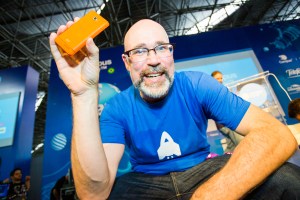For the longest time, Mozilla was synonymous with the Firefox browser, but for the last few years, Mozilla has started to look beyond Firefox, especially as its browser’s importance continues to wane. Over the last few years, Mozilla also started making startup investments, including into Mastodon’s client Mammoth, for example, and acquired Fakespot, a website and browser extension that helps users identify fake reviews. The organization also launched Mozilla.ai to bring more of its open source ethos into the AI space. It’s no surprise that AI is what the organization is focusing on right now. Indeed, when Mozilla launched its annual report a few weeks ago, it also used that moment to add a number of new members to its board — the majority of which focus on AI.
Late last month, I sat down with Mozilla’s president and executive director, Mark Surman, to discuss what’s next for Mozilla — and what that means for the fans and Firefox.
“In the last year and a half, we’ve been focused on making a pretty dramatic shift at Mozilla — to make it about not just more than the browser but also more than our kind of activist personality and build out a kind of portfolio that sets us up — and sets others up — to go and take our values into the AI era, or to the next era of the internet, however you want to talk about it.”
Mozilla AI
Mozilla launched Mozilla.ai just around the time GPT-4 launched and the first Llama models became widely available. Surman described this as a “focusing moment” for the organization. “Mozilla AI, which had a broad mandate around finding open source, trustworthy AI opportunities and build a business around them. Quickly, Moez [Draief], who runs it, made it about how do we leverage the growing snowball of open source large language models and find a way to both accelerate that snowball but also make sure it rolls in a direction that matches our goals and matches our wallet belt.”
While Mozilla did do some press around launching its AI efforts, we haven’t actually seen a lot of movement in that area from the organization since. Surman told me that the leadership team had been planning these efforts for almost a year, but as public interest in AI grew, he “pushed it out of the door.” But then Draief pretty much moved it right back into stealth mode to focus on what to do next. “At the high level, where we’re positioning ourselves to be about making it easier to use any of the open source large language models in a trustworthy, privacy-sensitive, affordable way.” Right now, Surman argued, it remains hard to for most developers — and even more so for most consumers — to run their own models, even as more open source models seemingly launch every day. “What Mozilla.ai is focused on really is almost building a wrapper that you can put around any open source large language model to fine-tune it, to build data pipelines for it, to make it highly performant.”
Mozilla buys Fakespot, a startup that identifies fake reviews, to bring shopping tools to Firefox
What exactly this will look like remains to be seen, but it sounds like we’ll hear quite a bit more in the coming months. Meanwhile, the open source and AI communities are still figuring out what exactly open source AI is going to look like. Surman believes that no matter the details of that, though, the overall principles of transparency and freedom to study the code, modify it and redistribute it will remain key.
“Is it just the freedom to redistribute the finished model? Is it the ability to study what’s inside? Is it to know what the weights are, to see what the data was? I think we’re still working on all of those questions. We probably lean towards that everything should be open source — at least in a spiritual sense. The licenses aren’t perfect and we are going to do a bunch of work in the first half of next year with some of the other open source projects around clarifying some of those definitions and giving people some mental models.”

Surman believes that open source AI is a necessary component for making the next era of the internet open and accessible for all — but by itself, it is not sufficient. With a small group of very well-funded players currently dominating the AI market, he believes that the various open source groups will need to band together to collectively create alternatives. He likened it to the early era of open source — and especially the Linux movement — which aimed to create an alternative to Microsoft. Then, he noted, when the smartphone arrived, there were a few smaller projects that aimed to create alternatives, including Mozilla (and at its core, Android is obviously also open source, even as Google and others have built walled gardens around the actual user experience). Those efforts weren’t really all that successful, though.
Surman seems to be optimistic about Mozilla’s positioning in this new era of AI, though, and its ability to both use it to further its mission and create a sustainable business model around it. “All this that we are going to do is in the kind of service of our mission. And some of that, I think, will just have to be purely a public good,” he said. “And you can pay for public goods in different kinds of way, from our own resources, from philanthropy, from people pooling resources. […] It’s a kind of a business model but it’s not commercial, per se. And then, the stuff we’re building around communal AI hopefully has a real enterprise value if we can help people take advantage of open source large language models, effectively and quickly, in a way that is valuable to them and is cheaper than using open AI. That’s our hope.”
What’s next for Firefox?
Where does all of this leave the Firefox browser. Surman argued that the organization is very judicious about rolling AI into the browser — but he also believes that AI will become part of everything Mozilla does. “We want to implement AI in a way that’s trustworthy and benefits people,” he said. Fakespot is one example of this, but the overall vision is larger. “I think that’s what you’ll see from us, over the course of the next year, is how do you use the browser as the thing that represents you and how do you build AI into the browser that’s basically on your side as you move through the internet?” He noted that an Edge-like chatbot in a sidebar could be one way of doing this, but he seems to be thinking more in terms of an assistant that helps you summarize articles and maybe notify you proactively. “I think you’ll see the browser evolve. In our case, that’s to be more protective of you and more helpful to you. I think it’s more that you use the predictive and synthesizing capabilities of those tools to make it easier and safer to move through the internet.”
In the early days of Firefox, people moved away from other browsers because Firefox was significantly better at blocking annoying pop-up ads. Now, Surman argues, Mozilla needs to think about what the equivalent of pop-up blocking is for today’s users. “The question that we’re asking ourselves now is: What’s the pop-up blocker for the AI era? What’s the thing that people are really going to want that stands for them and makes the experience of the internet better?”
Three years after its revamp, Firefox’s Android browser adds 450+ new extensions





























Comment